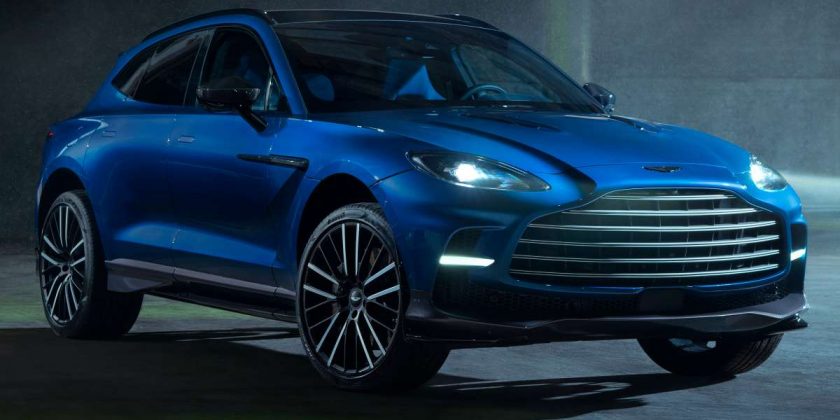The Aston Martin DBX is already a handy piece of kit, what with its Mercedes-AMG derived 4.0 litre twin-turbocharged V8 producing 550 PS and 700 Nm of torque. But we’re living in the Instagram and TikTok generation, where simply being handy isn’t enough – you need to be the best and the mostest at something. Welcome, everyone, to the DBX707 – the most powerful luxury SUV on the market.
As you might have guessed, the name refers to the amount of power on tap – 707 PS to be precise, a whopping 157 PS over the “standard” car. That’s more power than any AMG model on sale that doesn’t have any electric assistance. Torque, meanwhile, has been bumped up by a not-insignificant 200 Nm to 900 Nm.
The improvements come from new ball bearing turbos and revised engine mapping, while the Mercedes-sourced nine-speed automatic gearbox also swaps out its torque converter for a wet startup clutch to withstand the much higher torque output. This is essentially AMG’s Speedshift MCT 9G transmission that made its debut in the W213 E 63.
With a new launch control system and quicker, more direct shifts, the DBX707 swings its digital speedometer needle past the 100 km/h mark in just 3.3 seconds, matching the Porsche Cayenne Turbo GT and beating the Lamborghini Urus. Keeping all this speed in check are standard-fit carbon ceramic brakes with 420 mm front and 390 mm rear discs, clamped by six-piston callipers and tweaked to improve pedal feel and cooling.
Power continues to be sent to all four wheels through a variable setup that can shuffle up to 100% to the rear wheels, although the transfer case gets revised active logic for more harmonious and precise control between the driveline and the stability control. The electronic limited-slip differential at the back has also been strengthened to cope with the increased torque and has a shorter final drive ratio for more vivid acceleration.
Although the basic suspension layout and triple-chamber air springs remain identical, the DBX707 benefits from a retune that adds new damper valving and recalibrated spring volume switching for better body control and steering response. The 48-volt active roll stabilisation system has also been adjusted to improve agility and handling balance, while the electric power steering has been revised for greater effort build-up off-centre.
Naturally, the increased performance warrants a more extroverted exterior, so the DBX’s humongous grille – already the largest ever fitted to an Aston – has been made even bigger and filled with double slats. The LED daytime running lights have also been slimmed down to a single strip, allowing more air to flow into the new air intakes and brake ducts. A new front splitter has also been fitted.
Elsewhere, you get new louvred bonnet blades, dark satin chrome window trim and deeper and more heavily sculpted side sills. The rear end is embellished with a tailgate spoiler lip and a massive double diffuser integrating the quad exhaust tips. The wheels continue to be 22-inch items as standard, with 23s available that offer better steering response and body control through the larger tyres.
Step inside (the doors now come with a soft-close function, which is nice) and you’ll find a very similar interior to the standard car, albeit with standard Sport seats and new leather-and-Alcantara and full semi-aniline leather upholstery options. The centre console also sports a new rotary drive mode selector and dedicated buttons for the suspension, stability control, manual gearbox mode and active exhaust.
Of course, you’ll be able to choose from a multitude of options, such as carbon fibre and bronze metal mesh trim; you’ll also have access to a bewildering array of Q by Aston Martin personalisation options that will likely add a considerable amount to the price tag. Production will kick off in the first quarter of the year, with deliveries starting early the following quarter.
Source: Read Full Article



